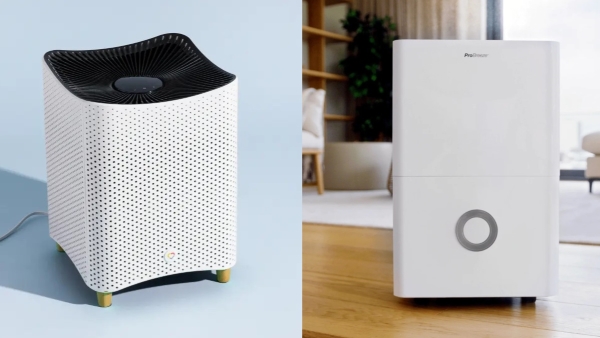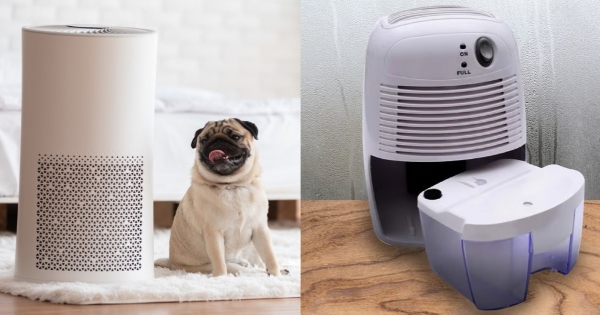Discover 4 Vital Differences: Air Purifier vs Dehumidifier
Have you ever wondered about the key differences between air purifiers and dehumidifiers? You’re in the right place! As someone who’s been using both devices for years, I can tell you each has its unique function. Through this friendly guide, I aim to share my experience and knowledge to help you distinguish between air purifier vs dehumidifier – ensuring you make the best choice for a healthier, happier home. So, ready to dive in? Let’s go!
2. Air purifiers are designed to purify the ambient air and are the better option for allergies and Covid-19.
3. Dehumidifiers’ primary function is to reduce humidity, making them an excellent choice for asthma and mold control.

What is an Air Purifier?
An air purifier is designed to cleanse the air in your surroundings, enhancing your home’s air quality. It works by drawing in air, filtering out unwanted pollutants like dust, allergens, impurities, and even airborne bacteria, and dispensing cleaner air into your environment.
The benefits of an air purifier are numerous – from combating allergy triggers and reducing chances of airborne diseases to even neutralizing unpleasant odors. My in-depth post here lets you learn more about the benefits of air purifiers.
In our “air purifier vs dehumidifier” comparison, understanding the role of an air purifier is fundamental. You’ll appreciate how it can create a healthier and more comfortable living space.
What Is a Dehumidifier?
A dehumidifier is a unique appliance engineered to lower and manage the humidity levels in the air around you. It absorbs excess moisture in your environment, reduces dampness, and maintains a comfortable and healthy humidity level.
When discussing the differences between air purifiers and dehumidifiers, it’s essential to understand the distinct benefits of a dehumidifier.
These include preventing the growth of mold and mildew, warding off pest infestations, and helping with conditions like asthma and allergies that can worsen in overly damp environments. Altogether, a dehumidifier aids in creating a healthier, fresher, and more comfortable home atmosphere.
Air Purifier vs. Dehumidifier: Comparison Table
Now, let’s dive into the heart of our discussion by comparing each device side-by-side. This comparison table will provide a snapshot of the key differences and similarities in operation, effectiveness, suitability, and cost.
With this information at your fingertips, you’ll be better equipped to determine which product best meets your needs. So, without further ado, let’s explore the comparison table:
| Air Purifier | Dehumidifier | |
|---|---|---|
| Operation | An air purifier filters and cleans the air by removing pollutants and allergens. | A dehumidifier extracts excess moisture from the air, maintaining an optimal humidity level. |
| Effectiveness | Highly effective in removing pollutants, allergens, and airborne bacteria, improving overall air quality. | Highly efficient in eliminating excess humidity and dampness, making the environment less favorable for mold and pests. |
| Suitability | Ideal for people suffering from allergies, asthma, and respiratory problems. Also beneficial in spaces where air cleanliness is vital, or odor is a concern. | Suited for spaces with high humidity levels and prone to mold growth or moisture damage. Also aids in alleviating symptoms for people with humidity-sensitive health conditions. |
| Cost | The cost depends on size, brand, and specific features like HEPA filters, and energy efficiency. Upfront expenses can be higher, but operational costs are usually manageable. | Prices vary based on size, brand, and features, including water tank capacity and energy efficiency. Dehumidifiers may cost less initially but can impact energy bills, especially if running continuously. |
Air Purifier or Dehumidifier: When to Use?
We’ve seen the critical differences in our “Air Purifier vs. Dehumidifier” comparison. Still, the ultimate question remains – when should you use each? Let’s untangle this query by looking at scenarios best suited for each device.

When to Use an Air Purifier
Air purifiers are your best bet in situations where you want to breathe cleaner, healthier air, viz:
- Allergy Season: When pollen is rampant, spring can be a challenging time for allergy sufferers. An air purifier can remove allergens like pollen from the indoor air, offering relief.
- Homes with Pets: An air purifier can limit fur, dander, and pet odors.
- Dusty Environments: Ideal for keeping your surroundings dust-free.
- Smoking Households: If someone in the house is a smoker, an air purifier can help filter out the harmful toxins and the smell of tobacco smoke.
- Urban or Industrial Areas: Air purifiers can be very beneficial if you live in a heavily populated or industrially busy area with inferior air quality. They filter out pollutants and toxins, improving indoor air quality.
When to Use a Dehumidifier
On the other hand, a dehumidifier is perfect for scenarios requiring moisture control:
- Damp Basements or Garages: Excessive moisture can lead to musty odors, warping wood, or even mold growth. A dehumidifier can help mitigate these problems.
- High Humidity Geographical Locations: If you live in a geographic area known for high humidity levels, a dehumidifier will offer relief by maintaining optimal humidity levels indoors.
- Condensation on Windows: If you often notice condensation build-up on windows, it’s a clear sign that your home could benefit from a dehumidifier.
- Allergy Symptoms: If increased humidity levels worsen your allergies or asthma, dehumidifiers can help by creating a less hospitable environment for dust mites and mold, which thrive in damp conditions.
Understanding when to use each will ensure you’re leveraging these devices in the most beneficial manner.
Air Purifier or Dehumidifier in Different Scenarios
Let’s delve into how air purifiers and dehumidifiers perform in different scenarios. Specifically, we will touch on situations such as asthma, allergies, mold, and in the context of Covid-19.
Air Purifier vs Dehumidifier: Which is Better for Asthma?

Both the air purifier and dehumidifier can provide relief to individuals with asthma but in different ways.
An air purifier filters out pollutants and allergens, including dust mites and pet dander, which can trigger asthma attacks [1]. Meanwhile, a dehumidifier reduces moisture, making the environment less hospitable for mold and dust mites, common asthma triggers.
If mold is causing your asthma symptoms, a dehumidifier can be more beneficial. Still, most people get more immediate relief from air purifiers.
Air Purifier vs Dehumidifier: Which is Better for Allergies?
Again, both devices can help with allergies. Air purifiers remove allergens from your air, keeping things like dust, pollen, and pet dander at bay. However, dehumidifiers lower humidity, discouraging the growth of mold and dust mites, common indoor allergens.
If humidity triggers your allergies, a dehumidifier could be your best option. Yet, an air purifier stands out in terms of extensively filtering airborne allergens.
Air Purifier vs Dehumidifier: Which is Better for Mold?
Between the two, a dehumidifier is generally the better option for tackling mold. While an air purifier can filter mold particles, it doesn’t address the root cause – high humidity. By reducing moisture levels, a dehumidifier prevents mold growth, targeting the problem at its source. Thus, in combating mold issues, a dehumidifier proves a more effective solution.
Air Purifier vs Dehumidifier for Covid-19

Air purifiers can help reduce airborne contaminants, including viruses, such as SARS-CoV-2 (COVID-19), along with other best practices recommended by CDC [2].
Dehumidifiers, on the other hand, don’t have a direct effect on the virus. However, they do keep humidity levels in check, aiding the general indoor environment of homes where viruses may not thrive as well.
Yet, in terms of dealing directly with viruses, an air purifier owns the advantage.
In sum, in our comparison, the choice between the two depends heavily on the specific requirements or issues.
FAQs
The choice between an air purifier and a dehumidifier depends on your requirements. An air purifier is suitable for removing pollutants and allergens and improving air quality. A dehumidifier is ideal for controlling moisture levels and preventing mold growth.
No, a dehumidifier is not an air purifier. It reduces excess moisture but does not purify the air by eliminating allergens or bacteria.
An air purifier won’t remove the actual humidity from the air. It eliminates airborne particles but cannot reduce moisture levels like a dehumidifier.
An air purifier and a dehumidifier serve two separate functions. Both would depend on specific needs such as allergies (air purifier) and controlling high humidity levels (dehumidifier).
No, an air purifier does not affect humidity levels or make a room too dry. It solely targets air quality by eliminating contaminants and pollutants.
A dehumidifier may slightly lower room temperature by removing moisture from the air, but it’s not designed as a cooling device. Its primary function is to reduce humidity levels.
Conclusion
The “air purifier vs dehumidifier” decision hinges on personal needs. An air purifier excels in nurturing indoor air quality, while a dehumidifier competently manages humidity and mold. To choose between them, consider your environment and health requirements.
For further help in decision-making, refer to my comprehensive posts on “best air purifiers review” and “best dehumidifier review.” These detailed guides will equip you with the insights needed to ensure you make the most suitable selection for your home.
Sources:
- American Lung Association) – Reduce Asthma Triggers
- Centers for Disease Control and Prevention (CDC). (2021). Ventilation in Buildings.
Tags: How-to
Beryl, a Pharmacy graduate, combines her academic expertise with a passion for cozy homes at Hometoppicks. With 3+ years of experience in researching and testing household and home care products, Beryl manages related content at Hometoppicks. Trust in her meticulous nature and profound knowledge to provide reliable advice and product suggestions, ensuring your home remains comfortable and convenient. You can find more about her here.
